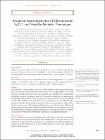| dc.contributor.author | GALLAGHER, LOUISE | |
| dc.contributor.author | GILL, MICHAEL | |
| dc.date.accessioned | 2009-11-26T16:35:05Z | |
| dc.date.available | 2009-11-26T16:35:05Z | |
| dc.date.issued | 2008 | |
| dc.date.submitted | 2008 | en |
| dc.identifier.citation | Mefford J, Sharp A, Baker C, Itsara A, Jiang Z, Buysse K, Huang S, Maloney V, Crolla J, Baralle D, Collins A, Mercer C, Norga K, De Ravel T, Devriendt K, Bongers E, de Leeuw N, Reardon W, Gimelli S, Bena F, Hennekam R et al `Recurrent Rearrangements of Chromosome 1q21.1 and Variable Pediatric Phenotypes? in The New England Journal of Medicine, 359, (16), 2008, pp 1685-1699 | en |
| dc.identifier.other | Y | en |
| dc.identifier.other | Y | |
| dc.identifier.uri | http://hdl.handle.net/2262/34988 | |
| dc.description | PUBLISHED | en |
| dc.description.abstract | Background Duplications and deletions in the human genome can cause disease or predispose persons to disease. Advances in technologies to detect these changes allow for the routine identification of submicroscopic imbalances in large numbers of patients.
Methods We tested for the presence of microdeletions and microduplications at a specific region of chromosome 1q21.1 in two groups of patients with unexplained mental retardation, autism, or congenital anomalies and in unaffected persons.
Results We identified 25 persons with a recurrent 1.35-Mb deletion within 1q21.1 from screening 5218 patients. The microdeletions had arisen de novo in eight patients, were inherited from a mildly affected parent in three patients, were inherited from an apparently unaffected parent in six patients, and were of unknown inheritance in eight patients. The deletion was absent in a series of 4737 control persons (P=1.1x10?7). We found considerable variability in the level of phenotypic expression of the microdeletion; phenotypes included mild-to-moderate mental retardation, microcephaly, cardiac abnormalities, and cataracts. The reciprocal duplication was enriched in nine children with mental retardation or autism spectrum disorder and other variable features (P=0.02). We identified three deletions and three duplications of the 1q21.1 region in an independent sample of 788 patients with mental retardation and congenital anomalies.
Conclusions We have identified recurrent molecular lesions that elude syndromic classification and whose disease manifestations must be considered in a broader context of development as opposed to being assigned to a specific disease. Clinical diagnosis in patients with these lesions may be most readily achieved on the basis of genotype rather than phenotype. | en |
| dc.description.sponsorship | Supported in part by grants from the National Institutes of Health (NIH) (HD043569, to Dr. Eichler), the South Carolina Department of Disabilities and Special Needs (to Drs. Skinner, Stevenson, and Schwartz), the Wellcome Trust (061183, to Dr. Tassabehji), the Andre & Cyprien Foundation and the University Hospitals of Geneva (to Drs. Antonarakis, Bena, and Gallati), and the European Union (EU) (project 219250, to Dr. Sharp; AnEUploidy project 037627, to Drs. Leeuw, Armengol, Antonarakis, Estivill, Veltman, and de Vries). The Irish Autism Study was funded by the Wellcome Trust and the Health Research Board (a grant to Drs. Gallagher and Gill). Dr. Poot was supported by a grant from the Dutch Foundation for Brain Research (Hersenstichting grant 2008(1) 34); Drs. Regan and Knight, by the Oxford Partnership Comprehensive Biomedical Research Centre; Dr. Willatt, by the Cambridge Biomedical Research Centre, with funding from the United Kingdom Department of Health's National Institute for Health Research Biomedical Research Centres funding scheme; Drs. Huang and Maloney, as part of the National Genetics Reference Laboratory (Wessex) by the United Kingdom Department of Health; Ms. Buysse, as a research assistant of the Research Foundation?Flanders (FWO?Vlaanderen); and Dr. Eichler, as an investigator of the Howard Hughes Medical Institute. | en |
| dc.format.extent | 893939 bytes | |
| dc.format.extent | 1132418 bytes | |
| dc.format.extent | 1685-1699 | en |
| dc.format.mimetype | application/pdf | |
| dc.format.mimetype | application/pdf | |
| dc.language.iso | en | en |
| dc.publisher | Massachusetts Medical Society | en |
| dc.relation.ispartofseries | The New England Journal of Medicine | en |
| dc.relation.ispartofseries | 359 | en |
| dc.relation.ispartofseries | 16 | en |
| dc.rights | Y | en |
| dc.subject | Psychiatry | en |
| dc.title | Recurrent Rearrangements of Chromosome 1q21.1 and Variable Pediatric Phenotypes | en |
| dc.type | Journal Article | en |
| dc.contributor.sponsor | Health Research Board | |
| dc.contributor.sponsor | Wellcome Trust | |
| dc.contributor.sponsor | Howard Hughes Medical Institute | |
| dc.contributor.sponsor | European Union (EU) | |
| dc.contributor.sponsor | National Institutes of Health (NIH) | |
| dc.type.supercollection | scholarly_publications | en |
| dc.type.supercollection | refereed_publications | en |
| dc.identifier.peoplefinderurl | http://people.tcd.ie/mgill | |
| dc.identifier.rssinternalid | 52812 | |
| dc.identifier.rssuri | http://dx.doi.org/10.1056/NEJMoa0805384 | |





